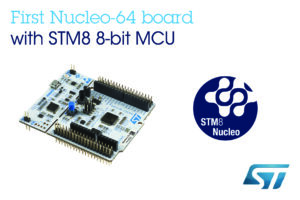 STMicroelectronics has introduced two STM8 Nucleo development boards, letting the 8-bit world experience the ease of access and extensibility with the STM32 Nucleo range.
STMicroelectronics has introduced two STM8 Nucleo development boards, letting the 8-bit world experience the ease of access and extensibility with the STM32 Nucleo range.
Leveraging the formula that has kickstarted countless STM32 embedded projects, the STM8 Nucleo boards give full access to all STM8 MCU I/Os through ST morpho headers, and contain Arduino Uno connectors that simplify functional expansion by accessing the vast ecosystem of open-source Arduino-compatible shields.
The two STM8 Nucleo boards are supported by major development toolchains including the Cosmic IDEA toolchain, the IAR EWSTM8 Integrated development environment, and the free STVD IDE from ST. Support for convenient features like drag-and-drop Flash programming accelerates design iterations. Each board comes with an integrated ST-LINK debugger/programmer, which eliminates any need for a separate debug probe.
By adding these entry-level STM8 configurations, over 40 Nucleo boards are now available, covering the full spectrum of performance, power, and memory combinations across ST’s complete families of 8-bit and 32-bit microcontrollers. Product creation is fluid and flexible, conveniently connected to open-source hardware communities, with freedom to adjust or optimize hardware and software at any time thereby eliminating risk and helping minimize time to market.
The new NUCLEO-8S208RB and NUCLEO-8L152R8 boards (including 64-pin STM8S208 and STM8L152 microcontroller respectively) are available now, priced from $10.32.

Besides ST’s NUCLEO-8S208RB and the NUCLEO-8L152R8 there also are two third-party Arduino-compatible STM8 boards: The sduino UNO and the sduino MB 208.
The sduino UNO is based on the low-end STM8S105K6 and, like the NUCLEO boards, has Ardunio UNO connectors.
The sduino MB 208 is a higher-end alternative to the NUCLEO and adunio UNO. It uses the top-of-the-line STM8S208MB at up to 24 Mhz (the other boards are limited to 16 Mhz) and Ardunio MEGA connectors.
Besides the closed source toolchains mentioned in the article, the NUCLEO and sduino boards are also supported by the free toolchain based on the Small Device C Compiler (SDCC, http://sdcc.sourceforge.net/).
For those wanting to use the NUCLEO or sduino boards bare-metal (i.e. without Ardunio-compability libraries), I wrote a few tutorials showing how to set up a timer, doing basic and serial I/O : http://www.colecovision.eu/stm8/
Philipp